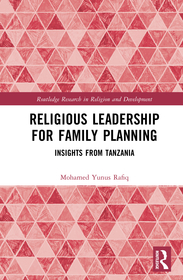
Religious Leadership for Family Planning
Insights from Tanzania
Sorozatcím: Routledge Research in Religion and Development;
-
10% KEDVEZMÉNY?
- A kedvezmény csak az 'Értesítés a kedvenc témákról' hírlevelünk címzettjeinek rendeléseire érvényes.
- Kiadói listaár GBP 145.00
-
69 273 Ft (65 975 Ft + 5% áfa)
Az ár azért becsült, mert a rendelés pillanatában nem lehet pontosan tudni, hogy a beérkezéskor milyen lesz a forint árfolyama az adott termék eredeti devizájához képest. Ha a forint romlana, kissé többet, ha javulna, kissé kevesebbet kell majd fizetnie.
- Kedvezmény(ek) 10% (cc. 6 927 Ft off)
- Kedvezményes ár 62 346 Ft (59 378 Ft + 5% áfa)
Iratkozzon fel most és részesüljön kedvezőbb árainkból!
Feliratkozom
69 273 Ft

Beszerezhetőség
Még nem jelent meg, de rendelhető. A megjelenéstől számított néhány héten belül megérkezik.
Why don't you give exact delivery time?
A beszerzés időigényét az eddigi tapasztalatokra alapozva adjuk meg. Azért becsült, mert a terméket külföldről hozzuk be, így a kiadó kiszolgálásának pillanatnyi gyorsaságától is függ. A megadottnál gyorsabb és lassabb szállítás is elképzelhető, de mindent megteszünk, hogy Ön a lehető leghamarabb jusson hozzá a termékhez.
A termék adatai:
- Kiadás sorszáma 1
- Kiadó Routledge
- Megjelenés dátuma 2025. november 28.
- ISBN 9781041085362
- Kötéstípus Keménykötés
- Terjedelem226 oldal
- Méret 234x156 mm
- Nyelv angol
- Illusztrációk 23 Illustrations, black & white; 23 Halftones, black & white 700
Kategóriák
Rövid leírás:
Over the last thirty years, religious leaders in Tanzania have increasingly been recruited to participate in sensitive health programs like family planning. Providing an innovative and nuanced theorization of development, religion, and health, this will be an important read for researchers of African Studies, and of faith-based development.
TöbbHosszú leírás:
Over the last thirty years, religious leaders in Tanzania have increasingly been recruited to participate in sensitive health programs like family planning. This book considers what happens when religious leaders, often envisaged as central to a project’s success, are unavailable.
Based on extensive ethnographic research, the book argues that in those situations, public health NGOs often create and co-opt religious leaders from religiously adjacent figures such as healers, marriage counsellors, and Quran teachers. These newly crafted religious leaders then in turn actively adapt and reshape their roles in ways that accommodate and sometimes diverge from the project's intentions. Challenging the conventional view of development as a linear process between developer and developee, this book reveals development as a layered and dynamic process shaped by intersecting visions and competing desires for spatio-temporal transformation. The book uses the Kiswahili concept kujiendeleza (‘to make oneself go’) to capture the awkward, unequal and creative connections between NGOs and the Muslim and Christian religious leaders they work with for the implementation of their plans. Far from being passive or disengaged, local actors actively engage with family planning and development projects in ways that reflect both their agency and the complexities of their socio-political contexts.
Providing an innovative and nuanced theorization of development, religion, and health, this book will be an important read for researchers of African Studies, and of faith-based development.
TöbbTartalomjegyzék:
Introduction Chapter 1: List from Afar Chapter 2: Peopling the List Chapter 3: Winning the Community Chapter 4: Schooling Religious Leaders Chapter 5: Of Science and Superstition Chapter 6: Selective Engagement Chapter 7: Uwepo, Spiritual Presence Conclusion
Több



